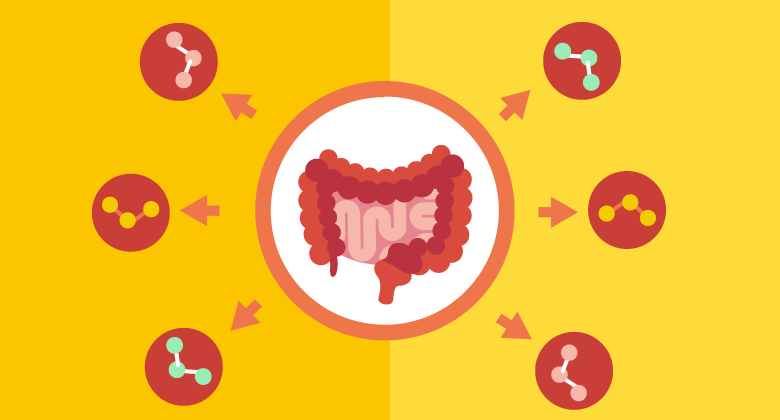Impact of gut microbiota on physical and mental health (MyNewGut)

Did you know that we are almost more bacteria than humans? More than 100 trillion bacteria that populate our large intestine make up our gut microbiota. 1 These bacteria encode over 100 times more genes than the human genome.
Our physical and mental health can be significantly affected by “our microbes,” or the tiny creatures (like bacteria) that make up the microbial ecosystem of our gut. This ecosystem is called our gut microbiota . Disruptions to this ecosystem (called “dysbiosis”*) can be dangerous to our health. Dysbiosis is actually linked to disorders such as obesity, metabolic syndrome, type 2 diabetes, and mental illness. But how exactly do these tiny “gut bugs” control various body and brain functions, and how can we apply this knowledge to prevent disease?
The EU-funded MyNewGut project has explored the universe of gut microbiota and tried to answer these questions by:
- Investigation of the role of the intestinal microbiota and its specific components in food metabolism and energy balance.
- Determination of specific components of the gut microbiota and metabolic functions that may contribute to or predict obesity, eating and emotional disorders, and associated conditions.
- Understanding the influences of environmental factors on the gut microbiota in pregnancy and during the development of the baby, and their effects on the brain, immune system and long-term metabolic health.
- Development of new food ingredients and food prototypes, through collaboration with the EU food industry, targeting the gut ecosystem with the aim of reducing the risk of metabolic and mental disorders.
In the last 5 years, the MyNewGuts partners have published 45 papers, and many more are on the way. The published papers include human and animal studies, as well as in vitro investigations and an extensive literature review. These studies have not only confirmed many existing hypotheses about the role of the gut microbiota, but have also made several promising discoveries. Let’s look at them in detail!
You may alos like: Venum boxing wraps: the best for both professionals and beginners
New intestinal bacteria could help combat obesity and mental illness
Bacteria make up >90% of all microorganisms in our intestines. 2 The MyNewGut project has discovered bacterial genera and strains in healthy people that appear to be effective in fighting obesity, metabolic and mood disorders. These influence the hormonal and immune systems, which affect both our physical and mental health. The bacterial strain ‘ Bacteroides uniformis CECT 7771′, for example, has shown preclinical efficacy on immune deficiencies and metabolic disorders in obese people. It leads, among other things, to a reduction in serum triglycerides and glucose intolerance, as well as a reduction in weight gain. 3 , 4 In addition, the MyNewGut partners have identified a Bifidobacterium longum bacterial strain that has a positive effect on perceived stress, sleep quality and the release of cortisol. These strains could potentially be developed as next-generation probiotics and used in the future to combat obesity and stress-related disorders (e.g. cognitive impairments such as reduced attention, reduced learning ability; or mood disorders such as depression).
How nutrition affects our gut microbiota
Diet is clearly an important factor influencing the composition and function of our gut microbiota. 5 , 6 The MyNewGut experts have conducted several human intervention studies with the aim of investigating the nutritional effects that may be mediated by the gut microbiota. They are currently publishing extensive position papers that provide useful evidence for future nutritional recommendations. These position papers are based on both the project results and new findings regarding the role of the gut microbiota and its interaction with diet on our health. The MyNewGut partners have specifically focused on the effect of proteins, fats and fiber on the gut microbiota.
How a high protein intake or a high-fat diet damages the gut microbiota
Protein intake benefits weight control and some aspects of metabolic health, but unlike carbohydrates, high intake can also have negative effects. The MyNewGut partners have found that high protein consumption increases protein fermentation in the colon, thereby generating some of the toxic metabolites (products of amino acid metabolism) associated with diseases such as colon cancer. During the 3-week “high protein intake” human intervention study conducted by Beaumont and colleagues, the protein source (animal or plant) resulted in marked differences in the metabolites generated. 7 It can therefore be argued that the protein source is an important factor for future research, especially regarding possible long-term effects of a high-protein diet on the gut microbiota and the metabolites generated. Wolters and colleagues have found that a high-fat diet, especially when rich in saturated fat, can have negative effects on the gut microbiota, characterized by lower numbers of microbes and fewer microbial species. A diet rich in omega-3 and omega-6 polyunsaturated fatty acids does not appear to have a negative impact on the gut microbiota, while the effects of monounsaturated fatty acids are less consistent (submitted for publication).
Dietary fiber is the main fuel of our intestinal microbiota
Dietary fiber is carbohydrates that are not digested by our digestive enzymes and therefore reach our large intestine intact. They are fermented by intestinal bacteria that form short-chain fatty acids (short-chain fatty acids: acetate, propionate and butyrate). These substances play an important role in intestinal health; for example, they protect the cells of the intestinal mucosa, cause the release of hormones involved in appetite and glucose metabolism, and reduce inflammation. 2 2 The fermentation of carbohydrates is therefore seen as beneficial for general intestinal health. Recent studies indicate that a higher intake of fiber than that indicated in current dietary recommendations (25-30 g fiber/day) may be necessary to achieve microbiome-related positive effects, such as the reduction of inflammatory markers. 8
High-fat or high-fiber diets are associated with depression in opposite ways
It has also been found that the interaction between diet and gut microbiota in mice fed a high-fat diet can modulate the gut-brain axis and ultimately exert a negative influence on brain function. 9 More specifically, the studies conducted by the MyNewGut partners have shown that the Western diet, rich in saturated fat, not only led to obesity but also to depressive behavior. Since they were reduced by antibiotic treatment, we know that these effects are mediated by the gut microbiome. These results represent only a starting point and new research would need to confirm this finding in humans. 10 By reviewing another study, it was found that a high-fiber diet is associated with fewer symptoms of depression, with prebiotic fiber influencing the composition of the gut microbiota, which impacts behavior. 11
The role of the gut in metabolic health: mechanistic clues
Studies in animal models conducted by the project partners have revealed new mechanisms by which the gut microbiota may impact metabolic health. The consortium has shown that the peptidase activity (DPPIV) responsible for the degradation of enteroendocrine hormones produced in the gut that regulate appetite and glucose homeostasis (such as glucagon-like peptide 1 [GLP-I]) is of bacterial origin. 12 This means that the presence of specific bacteria that produce these new enzymes can influence appetite, food intake and weight gain.
The gut microbiota: we are all different
The MyNewGut project has also investigated innovative interventions, including fecal microbiota transplantation (FMT) for the treatment of dysbiosis-associated diseases. In FMT, the microbiota of a healthy donor is transferred to a patient suffering from some form of dysbiosis. In the MyNewGut trials, the donor’s microbiota was transferred to people with metabolic syndrome. 5 In these studies, the patient’s response to treatment depended on their gut microbiota profile, suggesting the need for individualized treatment strategies. This study has also shown that the individual patient’s microbiota directly impacts neural systems that may mediate the influence of dietary intake on metabolic health (work in preparation).
Influence of microbial imbalance in early childhood on health
MyNewGut has demonstrated the importance of better understanding the influence of environmental factors and nutrition on the gut microbiota during critical developmental periods such as infancy and childhood. During these periods, the development and maturation processes of various organs and systems take place. It is therefore a crucial time for the development of a diverse gut microbiota. Dietary changes that have a positive effect on the gut microbiota have a higher and more sustainable effect during developmental periods. This highlights the importance of nutrition in the first phase of life for long-term health in adulthood. 2 The MyNewGut partners have specifically investigated whether environmental factors in infancy and childhood also influence health outcomes in later phases of human life. For example, they conducted a one-off longitudinal study in children to assess the role of microbiota, lifestyle (diet, exercise, etc.) and other individual factors (immune and metabolic profile) in the development of obesity. The study found that specific configurations of the microbiota are indeed related to inflammatory markers and dietary habits, and subsequently to the development of obesity. The MyNewGut partners have also shown that the mode of birth, a factor that influences the maturation of the microbiota in early life and could contribute to health programming, also affects vulnerability to stress in people in young adulthood. Birth by cesarean section negatively affects inflammatory markers and stress response.
Research in the field of gut health: what comes next?
Conclusion: the results of the MyNewGut project have shown that our gut is “a peculiar system” and that further research is needed to understand how it works and how it affects our health. The project has provided valuable insights into the role of the gut microbiota in both our metabolic and mental health. The results of the MyNewGut studies will play a crucial role in the future development of more effective gut-targeted treatments with the aim of tackling obesity, metabolic syndrome and behavioural disorders such as eating, mood and emotional disorders. In a few words: take care of your gut!



